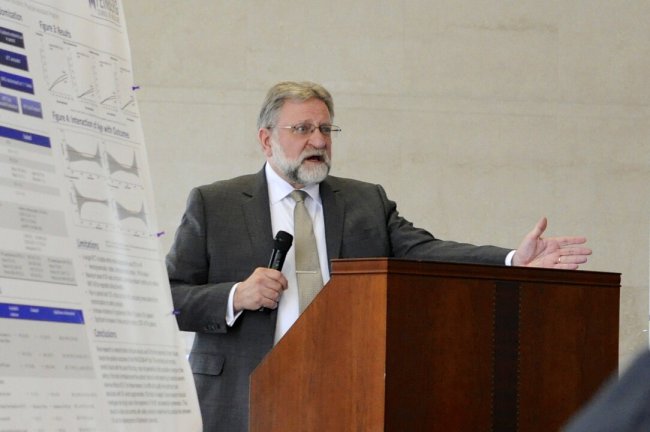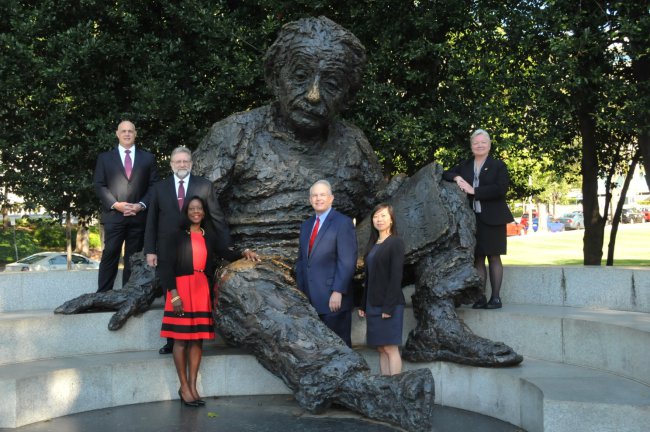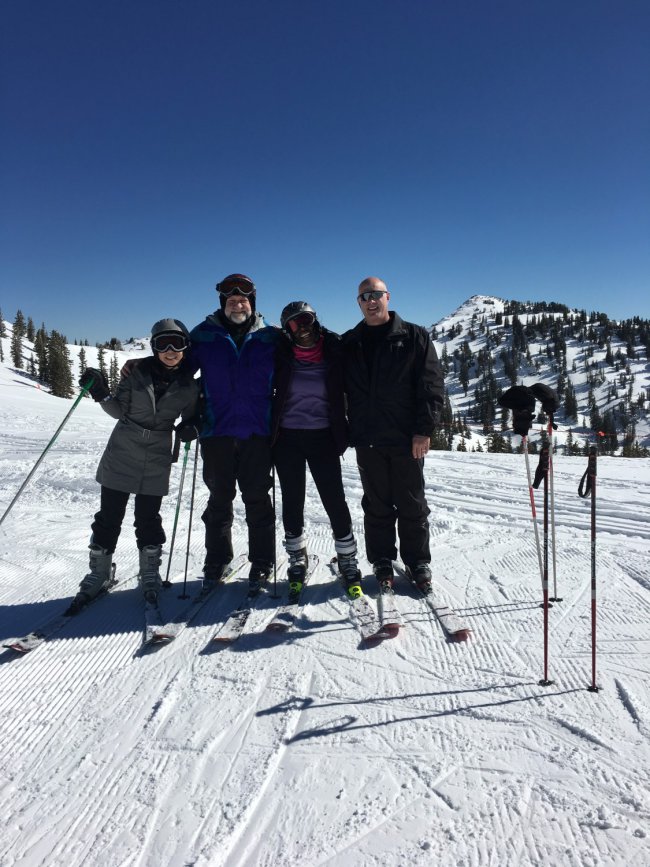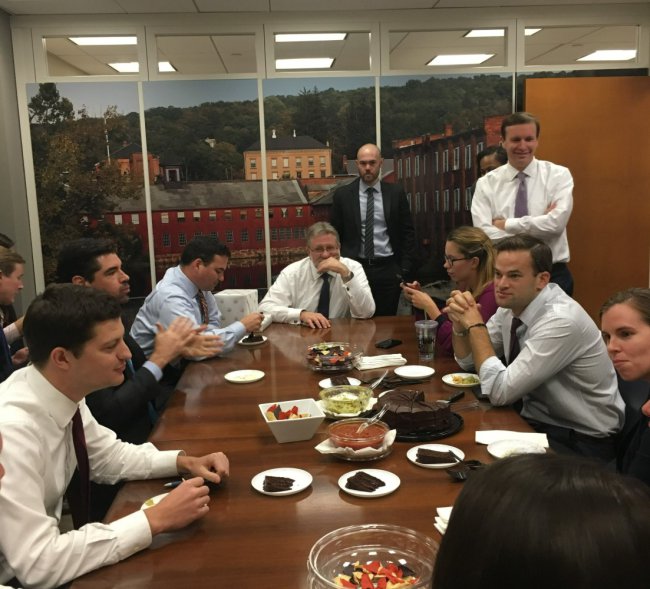From Front-Line Practice to Policymaking: How the RWJF Health Policy Fellows Program Helped David Keahey Open New Doors

David Keahey, 2015-2016 RWJF Health Policy Fellow. Photo courtesy David Keahey
By Marisa Coulton
David Keahey grew up in rural Idaho, where kids rarely aspired to college, much less to the RWJF Health Policy Fellows programin Washington, DC. So, when he applied for the program in 2014, his expectations were low. “I’m just this hick from Idaho,” said Keahey. “I don’t think they’ll grab a hold of me.”
As a child, his view of the world around him was limited, and he knew it. “It was like turning binoculars around and looking through it the wrong way,” he said. “I had blinders on, because rural Idaho was my world.”
Keahey grew up in what he calls a “different America.” Being lower middle class was the norm. Like most of the kids in his area, he started farming at a young age, driving a tractor, bucking hay, topping corn, and burning ditches for irrigation. “That is hard 12-hour-day work. It is also intelligent work because it’s dangerous.”
In his hometown, hard work was prized, while laziness was simply not tolerated. “The last thing you wanted to be known as [was] someone who was lazy.” Growing up in rural Idaho was character-building, he said. It instilled in him a strong work ethic and resilience. The kids in his graduating high school class channeled this energy into manufacturing and farming. But Keahey wanted something different. He became one of the few kids who decided to go to college.
At Boise State University, Keahey studied history and financed it through his own labor, working through the weekends and summers at a cold storage plant, throwing boxes on a dock into refrigerated rail cars, and bucking hay until nightfall. He wanted to become a history professor and get his MA and PhD, but he knew it wouldn’t be possible to finance graduate school through part-time work alone. Keahey knew the expiring Vietnam-era G.I. Bill would give him the funding he needed, so he joined the military and went from learning history to living it.

The 2015-2016 class of RWJF Fellows. Photo courtesy David Keahey
Keahey was stationed in West Germany outside of Stuttgart during the Cold War, working as a flight medic. His job was to stabilize patients aboard a Huey military helicopter as it flew the patient to the hospital for care. The role was fast-paced, and often took place in the dead of night. He loved it. “I call it a kick in the pants,” Keahey said. “It was very exciting duty.” He spent his leave time exploring Europe, jumping on cargo planes colloquially called “hops.”
He first learned about the role of a physician assistant during a 2 a.m. mission in Germany, where he and another medic were stabilizing a patient with a serious head injury. While they were flying back, the two medics got to talking. The medic told Keahey that he wasn’t a doctor, as Keahey had assumed, but rather a physician assistant, or PA. The more he learned, the more he liked it. Keahey had boarded the helicopter as an aspiring history professor but disembarked as an aspiring physician assistant.
He enrolled in the PA program at the University of Utah. He briefly considered becoming a physician, but he put the idea to bed. As far as he knew, only wealthy people became doctors. Medicine was not for “schmucks from Idaho, who started working at 11 years old,” he said. “It just didn’t seem to be in the cards, or a potential for me… I hate to say that, but that’s the erroneous idea that I had.”
The PA field was in its infancy—it had only been a profession for just over a decade when Keahey moved to Salt Lake City to begin the program. He didn’t want to continue in emergency medicine, as he’d done in the military. He went into family medicine instead, because he wanted enough time with patients to create a bond. “You establish relationships. You establish trust and rapport. And people can rely upon you,” he said.
Keahey was drawn to federally funded community health centers, which ensured access to care in underserved areas. He had worked in a for-profit clinic and knew it wasn’t for him. “The difference was pretty stark,” he said. At the for-profit clinics, patients got all the tests they needed (including some they didn’t need). At the community health centers, however, patients only got the testing required. “I determined pretty early on that my career was going to be in community health centers and not-for-profit medicine.” Besides, the community-based approach meshed with his rural background, he said.

Members of the 2015-2016 class of RWJF Fellows. Photo courtesy David Keahey
For his master’s thesis, he drafted a plan to improve health access to uninsured adults in Salt Lake City, and it was seriously considered by the health department. “I realized that I had been ineffective in my presentation of my idea,” he said. “I had not really anticipated the next steps…. How does one take a process through to making it operational from a legislative standpoint?” The failure lit a fire within him. “That really whetted my appetite for how people in the trenches, clinicians, could have an impact on the design of policy and care systems.”
His faculty advisor suggested that Keahey apply for the RWJF Health Policy Fellows program. Keahey requested the application, but it sat on his desk, untouched, for years. A familiar self-doubt had set in. He wasn’t ready. Not yet.
Keahey fulfilled his dream of becoming a professor, and joined the faculty at the University of Utah, where he did both classroom and clinical teaching. Finally, in 2014, over two decades after he had first requested the fellowship application packet, he felt he was ready, and with the encouragement of his wife and colleagues, applied. “I was just overjoyed when I got an interview,” he said. RWJF saw what Keahey himself was coming to realize: his rural background and orientation toward community health care were not disadvantages, but were, in fact, his greatest strengths. He was accepted as a RWJF Health Policy Fellow for the 2015-2016 year.
“I cannot stress [enough] how RWJF opens doors because of their gold-plated reputation.”
His most memorable fellowship experience took place during the passage of the Comprehensive Addiction Recovery Act, or CARA. A room full of Hill staffers, including Keahey, were discussing whether nurse practitioners and PAs should be allowed to prescribe buprenorphine, a highly effective treatment that was helping to mitigate the opioid crisis. Before CARA, only physicians were permitted to prescribe the drug. The staffers all seemed in agreement that prescription privileges should be limited.
Keahey looked around and realized he was the only clinician in the room. It would be up to him to offer a front-line practitioner perspective. He pointed out that the United States has a physician shortage, especially in rural America. PAs and nurse practitioners are providers of care for a large proportion of patients that need these medications. Heads began to nod. When CARA was passed, PAs and nurse practitioners were allowed to prescribe these lifesaving drugs.

Keahey with Senator Chris Murphy and staff. Photo courtesy David Keahey
Thomas C. Maynes, a member of Keahey’s cohort, considers Keahey a “poster boy” for the RWJF Health Policy Fellows program. Dave “actually got legislation done while he was working with Senator Chris Murphy of Connecticut,” said Maynes.
Keahey thinks his credibility as a clinician and RWJF Health Policy Fellow helped to influence the policymaking process. Being a fellow tended to have this effect, he said, piquing the interests of lawmakers and staffers alike. “I cannot stress [enough] how RWJF opens doors because of their gold-plated reputation,” he said.
“Always be reaching just beyond your grasp. Not just what’s close, but beyond your grasp. Because you will surprise yourself as to what you’re capable of doing.”
Maynes wasn’t the only one impressed by Keahey’s performance. When Keahey finished the fellowship, he went straight into the role of Chief Policy and Research Officer for the Physician Assistant Education Association (PAEA). “I would not have been able to perform that position with any degree of success without the RWJF fellowship experience,” he said. His participation in the fellowship not only uplifted him, but his field as a whole. “PAs are the forgotten profession in a lot of ways,” he said. Many people don’t know that “PAs practice medicine. We make independent decisions about patient care and consult when needed.”
Now, he endeavors to make sure that PA students like him “recognize impostor syndrome when they see it.” He helped develop a health policy fellowship for the PAEA, where 20 PA students have the opportunity to learn from speakers and go on Hill visits. He likes to tell them, “Always be reaching just beyond your grasp. Not just what’s close, but beyond your grasp. Because you will surprise yourself as to what you’re capable of doing.”
Keahey surprised himself. The fellowship “helped to solidify my own self-confidence,” he said. In the early days of the program, he was intimidated by his cohort, who he felt were smarter and more skilled than he was. From the perspective of the other fellows, however, the reality was quite different. “I was most impressed by Dave’s thoughtfulness and interest in all facets of our orientation,” said Maynes.
In any case, Keahey’s impostor syndrome didn’t last long. “At the end of it, I realized I [could] hold my own,” he said.
Learn more about RWJF Health Policy Fellows by following us on LinkedIn! For more information about the upcoming fellowship application, visit our website. We appreciate your support in building a strong and diverse network leaders and maintaining a workforce skilled in health policy. Email info@healthpolicyfellows.org for questions about program opportunities.
